Looking to invest but need some guidance? It can seem like a complicated thing to get into, but you don’t need to be an expert or even be rich to invest! You just need a decent understanding of how it works. Here are 10 tips to invest better.
1. Know Why You Are Investing
What big Life Goals do you want to support in the future? Any weddings, expensive education, or retirements on the horizon? Maybe you want to save for your dream car or even a holiday home. Or maybe you just want your money to keep up with or beat inflation so that it doesn’t decrease in value over time. There are always reasons to invest – but be sure at the outset that you know what your reasons are as it’s easier to work towards a goal.
2. Save Money and Know How Much to Invest
You don’t need to have savings in the first place to work with Oaktree Financial Services. Your options when investing with a broker are typically to either invest a lump sum or invest a regular amount each month (a savings plan). The trick is to assess if your money is working hard enough for you and knowing when to do something about it. Having a clear sense of what you can afford to invest and how often will help complete the picture. And remember to ask yourself two very important questions that are often overlooked:
• How much of this money might I need back at short notice?
• What is my exit strategy?
Knowing the answers to these questions can help you assess what type of investment will work for you.
3. Assess Your Attitude to Risk
This term “Risk” is bandied around a lot in investment conversations, but what does it mean to you? Figuring out what type of investment works for you is about how much risk you want to take with your money. Understanding yourself and your own priorities is critical as you venture into the world of investments. Risk and return go hand in hand, so it goes without saying that this is the starting point for any investment strategy.
4. Spread Your Investments – Diversify!
Investors are always talking about diversifying, but this is more than just a buzzword; it is an approach to investing that reflects many people’s attitudes towards risk. Would you, like the old saying goes, put all your eggs in one basket? Spreading your investments across a range of asset classes can be advantageous especially if you want the security of knowing your money isn’t dependent on the performance of one asset class, business sector, or country. Diversified portfolios may well underperform in a bull equity market, but on the whole, they are a good choice for those who prefer a smoother investment ride over the long term.
5. Spend Time Thinking About Your Financial Future
How much time do you spend thinking about your finances (especially making provisions for the future)? In the world we live in today finances are within the top 3 list of things that people worry about in life (along with relationships and work). Investing your money soundly and having a strategy for your future finances can help to eliminate a large chunk of stress in life. Spending some time reading about and researching your investment options is time well spent.
6. Consider How “Active” You Want to Be
Without doubt, some people get bitten by the investing bug. With handy apps on your phone that allow you to check the performance of your investments on a minute-by-minute basis, investing can become an addictive pastime. You may get a real thrill following the news and predicting how the markets will respond or following the stock prices of a hot tip you’ve heard, in which case being actively involved in your portfolio and investment choices will be important to you. However, you may want to invest your money in a passive fund, and sit back, relax and think about it again in the future when you’re looking to cash in. Or perhaps you could manage a bit of both. Knowing how involved you want to be in your investments is an important conversation to have with your advisor.
7. Keep it Simple
Investing doesn’t have to be complicated or terribly risky, though it can be easy to be tempted outside of your levels of competence and comfort by the potential of high returns. Know the limits of your knowledge and competence and try to remain within them. You can always set aside a small portion of your portfolio for “dabbling” purposes – that way you can satisfy those urges to be bolder and more adventurous without risking your serious money. Remember, a good investment is one you can understand. Working with a broker like Oaktree Financial Services will make the investment process a lot more simple for you.
8. Remember That You Are In Control
While the fluctuations of the stock market and housing market being beyond the control of most of us mere mortals, it is important to remember that as a private investor you can assemble your portfolio however you want. You have control over where you invest, how much you invest, and when you invest – even if exercising this control means handing over the burden of responsibility and “active” management to a trusted advisor. You have the control to make sensible decisions about your financial future.
9. Familiarise Yourself With Investment Terminology
Do you know the difference between open and closed investment structures? Do you know what a bull and a bear market are? It’s not that you need to become an investment expert in order to venture into the world of investing, but acquainting yourself with the language of investing can help demystify it and increase your confidence and understanding. There are some great investment guides available, so take the time to learn a little – it could go a long way.
10. Think About Long-Term Gain Over Short-Term Reward
We encourage a sensible approach to investing that looks at the bigger picture: a long-term successful strategy that is unflinching in the face of short-term underperformance. Investing when markets are falling is a good time to build a strong portfolio at great prices, but the result can be short-term loss and underperformance. Patience and discipline really pay off. Remember, it is more about time in the market than timing the market!
Want to learn more about investing? Or maybe you’re ready now? Give us a call on 025-30588 or book a complimentary chat.

Adrian Godwin is a Senior Financial Consultant and the co-founder and managing director of Oaktree Financial Services. With a background in accounting and tax advising, Adrian specialises in estate planning and wealth management.Adrian offers clients reassurance through best practice solutions. His unique skill set and qualifications enable clients to develop comprehensive life plans that align with their goals.


